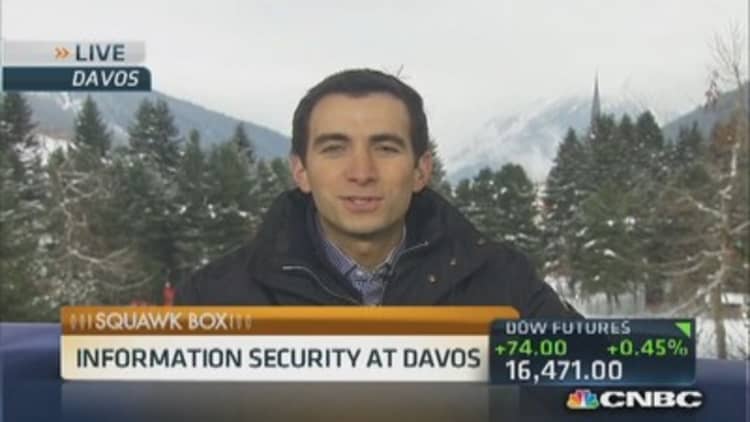A broad range of jobs that once seemed beyond the reach of automation are in danger of being wiped out by technological advances, Eric Schmidt, executive chairman of Google, warned on Thursday.
Speaking in a briefing at the World Economic Forum in Davos, he said that an acceleration in technological innovation made this one of the biggest problems the world faces in the next 20 to 30 years.
(Read more: Latest perk on Google buses: Security guards)
"The race is between computers and people and the people need to win," he said. "I am clearly on that side. In this fight, it is very important that we find the things that humans are really good at."
Mr. Schmidt's comments follow warnings from some economists that the spread of information technology is starting to have a deeper impact than previous periods of technological change and may have a permanent impact on employment levels.
Google itself, which has 46,000 employees, has placed big bets on automation over some existing forms of human labor, with a series of acquisitions of robot start-ups late last year. Its high-profile work on driverless cars has also led to a race in the automobile industry to create vehicles that can operate without humans, adding to concerns that some classes of manual labor once thought to be beyond the reach of machines might eventually be automated.
(Read more: With new malware, you have to pay to get your files back)
Recent advances in artificial intelligence and mobile communications have also fueled fears that whole classes of clerical and research jobs may also be replaced by machines. While such upheaval has been made up for in the past by new types of work created by advancing technology, some economists have warned that the current pace of change is too fast for employment levels to adapt.
Mr. Schmidt said governments had to encourage rapidly growing "gazelle" companies to counter such trends and create new jobs. He cited shale gas fracking in the US, a technology developed mainly by smaller companies that had created an employment boom.

"There is quite a bit of research that middle class jobs that are relatively highly skilled are being automated out," he said. The auto industry was an example of robots being able to produce higher quality products, he added.
(Read more: Scammers target utility customers)
New technologies were creating "lots of part-time work and growth in caring and creative industries . . . [but] the problem is that the middle class jobs are being replaced by service jobs," the Google chairman said.
He said that governments needed to invest in education systems to improve skill levels and human cognition. "It is pretty clear that work is changing and the classic nine to five job is going to have to be redefined," he said. "Without significant encouragement, this will get worse and worse."
More from the Financial Times:
More from the Financial Times:
Is a robot coming to take your job?
Google in second Swedish wind farm deal
Samsung warns of weak earnings growth
Mr. Schmidt expressed doubts about Microsoft's decision to allow foreign customers to have data stored on servers outside the US to provide protection against surveillance by the National Security Agency. This would not stop the agency requesting such data under US law, he said.
"My understanding is that data in another country is still subject to [US intelligence] laws. It is not obvious to me how you get around that rule. You would have to transfer the assets to a foreign corporation," he said.
—By John Gapper and Richard Waters of the Financial Times

